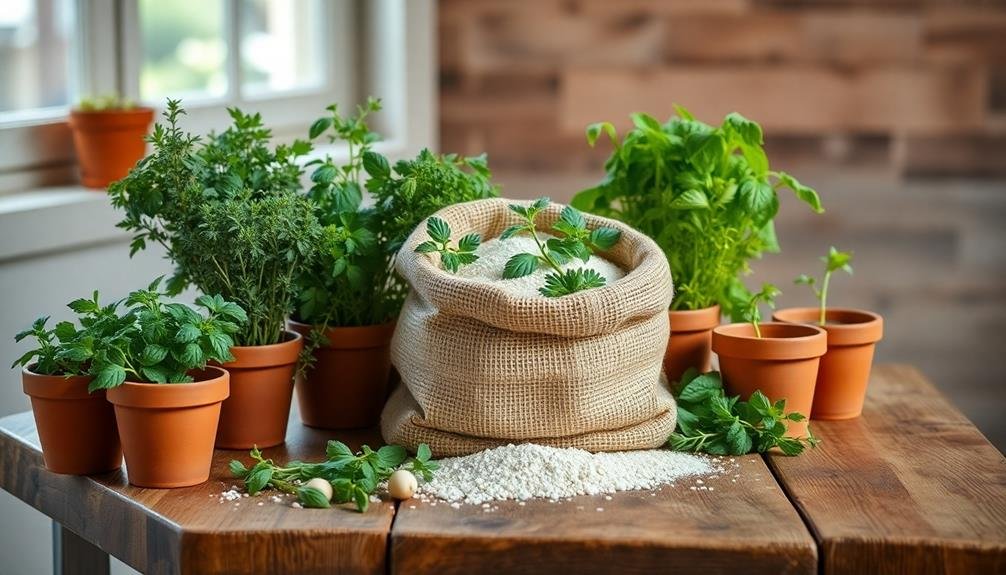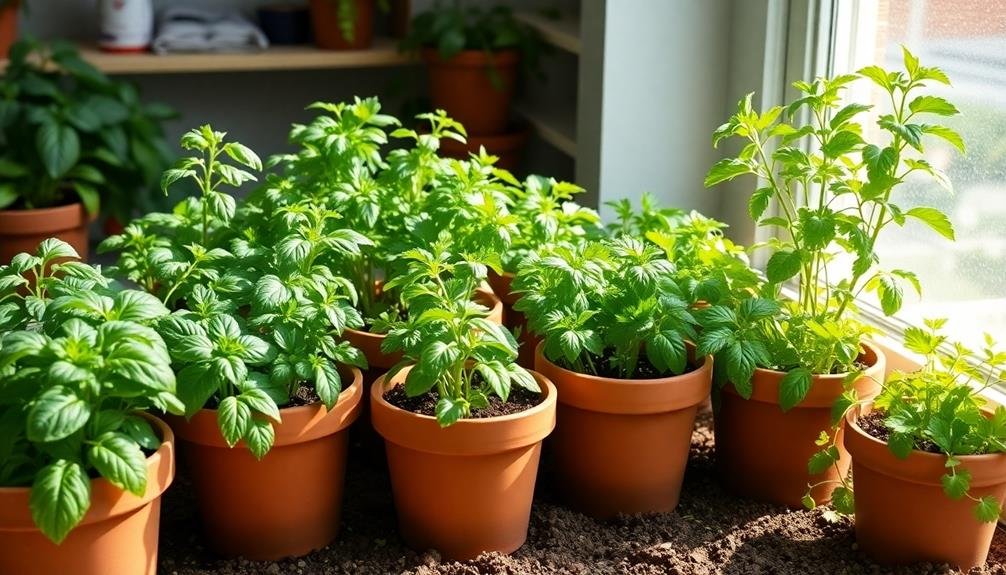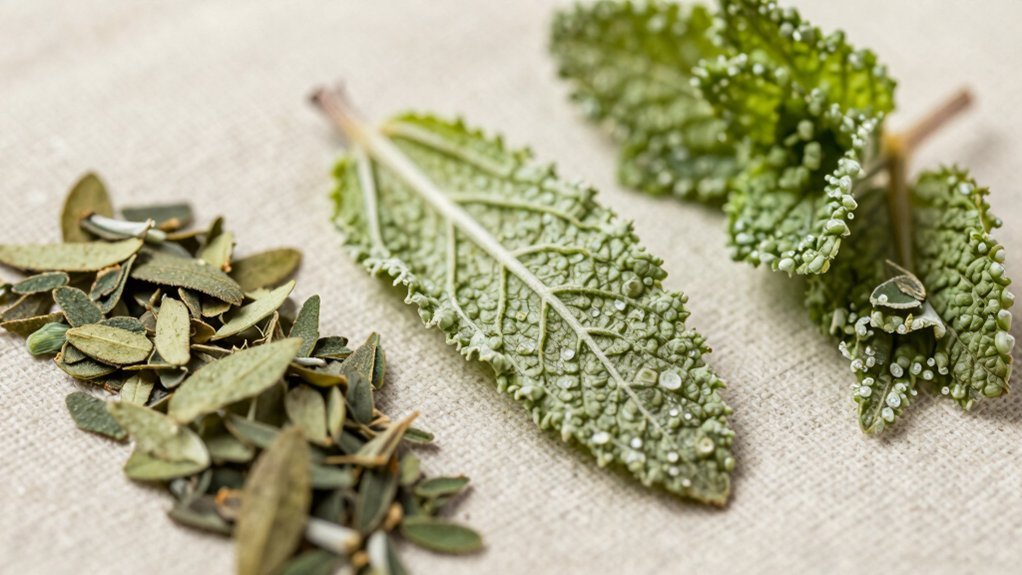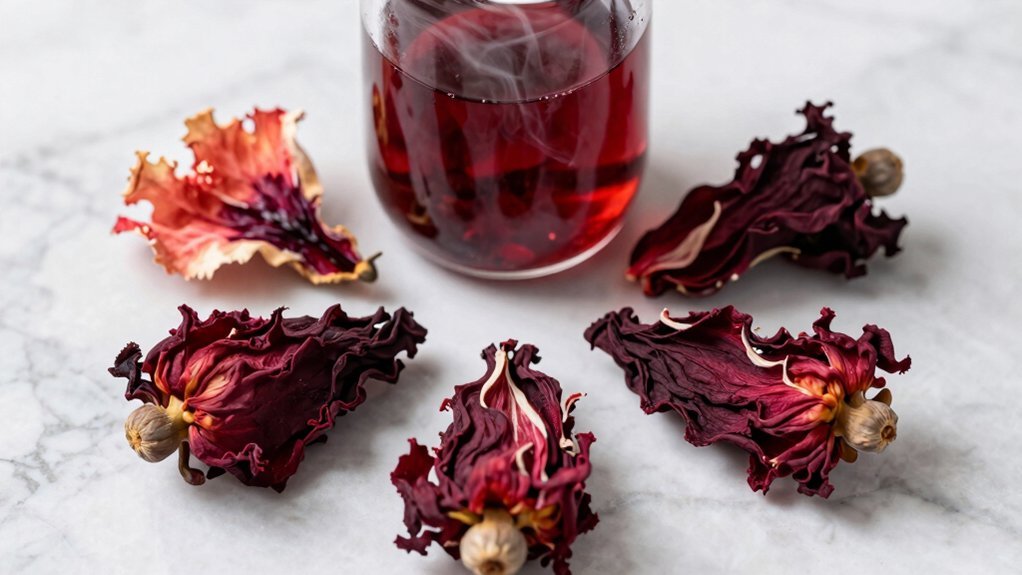The best organic fertilizers for your indoor herbs include compost, fish emulsion, and seaweed extract. Compost enriches the soil with essential nutrients and beneficial microbes, while fish emulsion boosts nitrogen levels for leafy growth. Seaweed extract enhances overall plant health and increases resistance to stress. You can also use homemade options like banana peels for potassium or coffee grounds for nitrogen. Remember to fertilize every 4-6 weeks during the growing season and dilute your fertilizers to avoid nutrient overload. With a few tricks, you'll cultivate a thriving herb garden that's full of flavor—there's more to uncover about this topic!
Importance of Organic Fertilizers

Organic fertilizers play an indispensable role in nurturing indoor herbs, enhancing both their growth and flavor. When you choose organic options, you're opting for a healthier approach that promotes soil health and plant resilience.
These fertilizers provide a balanced supply of nutrients, which helps your herbs thrive without the harsh chemicals found in synthetic alternatives. Using organic fertilizers boosts microbial activity in the soil, creating a vibrant ecosystem that supports your plants.
This natural interaction improves nutrient absorption, leading to more robust growth and richer flavors. Your indoor herbs can flourish in a sustainable environment, making them healthier for you and your family.
Moreover, organic fertilizers often release nutrients slowly, giving your herbs a steady supply over time. This gradual nourishment reduces the risk of nutrient leaching and helps maintain a consistent growth pattern.
By fostering a healthy root system, your herbs can access essential minerals more effectively. In short, investing in organic fertilizers not only benefits your plants but also aligns with environmentally conscious practices.
You'll be rewarded with thriving, flavorful herbs that enhance your culinary creations while supporting a greener planet.
Types of Organic Fertilizers
When it comes to organic fertilizers, you'll find various types that can boost your indoor herbs.
Compost and vermicompost are excellent options, offering rich nutrients while improving soil health.
Additionally, liquid organic fertilizers provide a quick nutrient boost that your herbs can readily absorb.
Compost and Vermicompost Benefits
Compost and vermicompost are powerhouse options for enriching your indoor herb garden. They provide essential nutrients and beneficial microorganisms that promote healthy growth. Using these organic fertilizers can markedly enhance the quality of your herbs, making them tastier and more aromatic.
Here are some key benefits of compost and vermicompost:
- Nutrient-Rich: They supply a balanced mix of nutrients, including nitrogen, phosphorus, and potassium, essential for plant health.
- Improved Soil Structure: They help improve soil aeration and water retention, creating an ideal environment for root development.
- Microbial Boost: They introduce beneficial microorganisms that combat plant diseases and improve nutrient uptake.
- Sustainable: By recycling kitchen scraps and garden waste, you're reducing landfill waste while enriching your plants.
- Cost-Effective: Making your own compost or vermicompost is a budget-friendly way to fertilize your herbs without relying on store-bought products.
Incorporating compost and vermicompost into your indoor herb garden won't only enhance growth but also contribute to a healthier environment.
You'll see the difference in both the vitality of your herbs and the satisfaction of knowing they're nurtured organically.
Liquid Organic Fertilizer Options
Liquid fertilizers can be a game-changer for your indoor herb garden, delivering nutrients directly to the roots where they're needed most. These fertilizers are typically easy to apply and can quickly enhance the growth and flavor of your herbs.
One popular option is fish emulsion, which provides a rich source of nitrogen and other essential nutrients. It's especially beneficial for leafy herbs like basil and cilantro.
Another excellent choice is seaweed extract, packed with micronutrients and growth hormones that promote overall plant health. This option can help your herbs withstand stress and improve their flavor.
You might also consider using compost tea, a nutrient-rich liquid created by steeping compost in water. It's a fantastic way to harness the benefits of compost while providing a readily absorbable form of nutrients.
Additionally, there are many commercial liquid organic fertilizers available, often derived from plant or animal sources, which can offer balanced nutrition tailored to your herbs' needs.
When using liquid fertilizers, always dilute them according to the instructions to prevent over-fertilization, and apply them during your herbs' active growing season for the best results.
Compost for Indoor Herbs

Compost is a fantastic way to boost the health of your indoor herbs, providing essential nutrients and improving soil structure.
You can choose from various types of compost, each with unique benefits, to suit your plants' needs.
Plus, mastering application techniques guarantees your herbs get the right amount of nourishment for ideal growth.
Benefits of Composting
Using compost for your indoor herbs can greatly enhance their growth and energy. This rich, organic material provides essential nutrients that promote healthy development and vibrant flavor.
You'll find that your herbs thrive in an environment enriched with compost, leading to a more productive indoor garden.
Here are some key benefits of using compost for your indoor herbs:
- Improved Soil Structure: Compost helps aerate the soil, allowing for better root growth and water retention.
- Nutrient-Rich: It contains a balanced mix of nutrients, ensuring your herbs receive what they need to flourish.
- Microbial Activity: Compost introduces beneficial microbes that support plant health and combat diseases.
- Sustainable: Using compost is an eco-friendly way to recycle kitchen scraps and yard waste, reducing landfill waste.
- Cost-Effective: Making your own compost can save you money on store-bought fertilizers.
Types of Compost
When it comes to enriching your indoor herb garden, various types of compost can make a significant difference. You can choose from several options, each with unique benefits.
First, there's traditional compost, made from kitchen scraps, yard waste, and other organic materials. This type is rich in nutrients and beneficial microorganisms, promoting healthy growth.
Next, you might consider worm castings, a nutrient-dense form of compost produced by earthworms. They're fantastic for boosting soil structure and improving moisture retention.
Another option is mushroom compost, which results from growing mushrooms. It's often high in organic matter and can enhance the soil's water-holding capacity.
If you're looking for something more specialized, consider compost tea. This liquid fertilizer, brewed from compost, provides a quick nutrient boost for your herbs.
Additionally, you can explore ready-made compost blends, specifically formulated for indoor plants. These can save you time and guarantee your herbs receive the right balance of nutrients.
Whichever type you choose, incorporating compost into your indoor herb garden will help create a thriving, productive environment for your plants.
Application Techniques
To achieve the best results in your indoor herb garden, applying compost effectively is crucial. Compost enriches the soil, providing your herbs with nutrients they need to thrive.
Here are some techniques to help you apply compost correctly:
- Mix it into the soil: Blend compost with potting mix for a nutrient-rich base.
- Top-dress your plants: Sprinkle a thin layer of compost on the surface of the soil, allowing it to gradually enrich the plants as you water.
- Create compost tea: Steep compost in water for a few days, then use this nutrient-rich liquid to water your herbs.
- Apply during repotting: When moving herbs to larger pots, add compost to the new soil to boost nutrients right from the start.
- Monitor moisture levels: Keep an eye on the moisture in your pots, as compost can retain water. Adjust your watering schedule accordingly.
Using these techniques won't only enhance the growth of your herbs but also guarantee they stay healthy and vibrant.
Happy gardening!
Fish Emulsion Benefits
Fish emulsion is a powerhouse organic fertilizer that can greatly enhance the growth of your indoor herbs. It's rich in nutrients, particularly nitrogen, phosphorus, and potassium, which are essential for healthy plant development. When you apply fish emulsion, you're giving your herbs a natural boost that promotes lush foliage and vibrant growth.
One of the biggest benefits of using fish emulsion is its ability to improve soil structure. The organic matter in fish emulsion helps retain moisture and increases microbial activity, which can lead to healthier root systems. This means your herbs can access nutrients more effectively.
Moreover, fish emulsion is easy to use. You can dilute it in water and apply it directly to the soil or use it as a foliar spray. This versatility makes it a convenient choice for any indoor gardener.
You'll also appreciate its relatively low odor compared to other fish-based fertilizers.
Seaweed Extract Advantages

When you choose seaweed extract for your indoor herbs, you're tapping into a nutrient-rich composition that can truly boost your plants.
It not only enhances soil structure but also promotes healthy growth, making it an excellent addition to your gardening routine.
You'll notice the difference as your herbs thrive and flourish!
Nutrient-Rich Composition
Harnessing the power of seaweed extract can considerably enhance your indoor herb garden. This nutrient-rich composition offers a variety of benefits that make it an excellent choice for your plants. Packed with essential minerals and vitamins, seaweed extract promotes healthy growth and vibrant flavors in your herbs.
Here are some advantages you'll enjoy when using seaweed extract:
- High in micronutrients: Contains trace elements like iron, zinc, and manganese, essential for plant health.
- Natural growth hormones: Stimulates root development and encourages robust plant growth.
- Increases resistance: Helps your herbs withstand pests and diseases, reducing the need for chemical treatments.
- Improves nutrient uptake: Enhances the ability of your plants to absorb other nutrients in the soil, making your fertilization efforts more effective.
- Boosts flavor: Contributes to the overall taste and aroma of your herbs, making them more enjoyable to use in your cooking.
Enhances Soil Structure
One of the key benefits of using seaweed extract is its ability to enhance soil structure. When you incorporate seaweed extract into your indoor herb garden, you're not just feeding the plants; you're improving the very foundation they grow in. The natural compounds in seaweed help to create a more aerated soil, allowing water and nutrients to penetrate more effectively.
This improved soil structure means that your herbs can develop stronger root systems. As roots spread out and grow deeper, they access more nutrients and moisture, which in turn supports healthier plants.
Seaweed extract also encourages the growth of beneficial microorganisms in your soil. These microorganisms play an essential role in breaking down organic matter, making nutrients more readily available to your herbs.
Additionally, seaweed extract can enhance water retention in your soil, reducing the frequency of watering while ensuring your herbs stay hydrated. By improving both aeration and moisture retention, you create an ideal environment for your indoor herbs to thrive.
Ultimately, using seaweed extract not only benefits your plants directly but also creates a robust and resilient soil ecosystem for long-term success.
Promotes Healthy Growth
Seaweed extract is a powerhouse for promoting healthy growth in your indoor herbs. Packed with essential nutrients, it can give your plants the boost they need to thrive.
When you incorporate seaweed extract into your indoor gardening routine, you'll notice several benefits that contribute to robust herb growth:
- Rich in Micronutrients: Provides essential elements like iron, zinc, and manganese, important for plant health.
- Stimulates Root Development: Encourages stronger root systems, enhancing nutrient uptake and stability.
- Boosts Resilience: Increases plants' resistance to stress factors such as drought, pests, and diseases.
- Enhances Photosynthesis: Improves chlorophyll production, leading to better energy conversion and growth rates.
- Promotes Soil Microbial Activity: Supports beneficial microorganisms in the soil, creating a healthier growing environment.
Worm Castings as Fertilizer
Worm castings, often referred to as "black gold," are a powerful organic fertilizer that can greatly enhance the growth of your indoor herbs.
These nutrient-rich castings are produced by earthworms as they break down organic matter, making them an excellent choice for your herb garden. When you use worm castings, you're not just adding nutrients; you're also improving soil structure and moisture retention, giving your herbs the best environment to thrive.
To incorporate worm castings into your indoor herb routine, you can mix them into your potting soil or top-dress your plants. A general guideline is to use about a quarter cup of worm castings for each plant, ensuring even distribution.
You can also create a worm casting tea by steeping the castings in water for a few days, allowing you to water your herbs with a nutrient-rich liquid.
The benefits of using worm castings are numerous. They're packed with essential nutrients like nitrogen, phosphorus, and potassium, as well as beneficial microbes that promote soil health.
Bone Meal Nutrients

While many gardeners seek out diverse nutrient sources, bone meal stands out as a rich organic fertilizer for enhancing indoor herbs. This natural product is primarily composed of ground animal bones and offers a unique blend of nutrients that can markedly benefit your herb garden.
Using bone meal provides several advantages:
- High Phosphorus Content: Essential for root development and flowering.
- Slow-Release Nutrients: Gradually feeds your herbs over time, ensuring steady growth.
- Supports Microbial Activity: Enhances soil health by promoting beneficial bacteria.
- Improves Soil Structure: Helps retain moisture and improve drainage.
- Organic and Sustainable: A natural option, free from synthetic chemicals.
When you incorporate bone meal, you're not just feeding your herbs; you're enriching the soil environment, which can lead to healthier plants and more vibrant flavors.
Just be sure to follow recommended application rates, as too much can lead to nutrient imbalances.
With the right approach, bone meal can be an excellent addition to your indoor herb care routine, ensuring your plants thrive and produce flavorful herbs year-round.
Blood Meal for Growth
For those looking to give their indoor herbs a powerful boost, blood meal is an exceptional organic fertilizer. Packed with nitrogen, it promotes vigorous growth, making it particularly beneficial for leafy herbs like basil, parsley, and cilantro.
When you use blood meal, you're supplying your plants with a readily available source of nutrients that can enhance their overall health and yield.
You can apply blood meal in several ways. Mixing it into the soil before planting is an effective method, ensuring that your herbs start with a strong nutrient foundation.
Alternatively, you can create a diluted solution with water and apply it as a top dressing during the growing season. Just be cautious with the amount; a little goes a long way, as excessive nitrogen can lead to lush foliage at the expense of flavor.
Be mindful of how often you fertilize. Typically, applying blood meal every 4-6 weeks is enough to keep your indoor herbs thriving.
Always monitor your plants for signs of nutrient deficiency or excess. With the right care, blood meal can help your indoor herb garden flourish like never before.
Liquid Fertilizers Options

Liquid fertilizers offer a convenient and effective way to nourish your indoor herbs, delivering essential nutrients directly to the roots.
They're especially beneficial when your plants show signs of nutrient deficiency or if you want to provide a quick nutrient boost.
Here are some great organic liquid fertilizer options to evaluate:
- Fish Emulsion: Packed with nitrogen, it encourages vigorous growth and is easy to apply.
- Seaweed Extract: Rich in trace minerals and growth hormones, it promotes healthy root development and overall plant vigor.
- Compost Tea: A nutrient-rich brew made from steeping compost in water, it enhances soil microbial activity and supplies a balanced mix of nutrients.
- Aloe Vera Juice: Known for its soothing properties, it also provides micronutrients that can benefit your herbs.
- Molasses: A source of carbohydrates, it feeds beneficial soil microbes, which in turn can help your plants thrive.
Homemade Organic Fertilizers
Creating homemade organic fertilizers can be a rewarding way to nourish your indoor herbs while utilizing readily available materials. One effective option is banana peels, which are rich in potassium.
Simply chop them up and bury them in your herb pots or soak them in water for a nutrient-rich liquid fertilizer.
Another great choice is coffee grounds. They add nitrogen to the soil and improve drainage.
Just sprinkle used coffee grounds around the base of your herbs or mix them into the potting soil.
If you've got eggshells, don't throw them away. Crush them into small pieces and add them to your potting mix for a calcium boost.
You can also create a simple compost tea. Steep a handful of compost in a bucket of water for a few days, then strain the mixture.
This nutrient-dense liquid can be diluted and used to water your herbs, providing them with essential nutrients.
Tips for Fertilizing Herbs

When it comes to fertilizing herbs, timing and technique play a significant role in promoting healthy growth. To guarantee your indoor herbs thrive, it's important to follow some essential tips.
First, choose the right type of organic fertilizer that suits your herbs' needs. Here are some key points to keep in mind:
- Fertilize during the growing season: Apply fertilizer every 4-6 weeks while your herbs are actively growing in spring and summer.
- Use diluted solutions: Always dilute your organic fertilizers to avoid overwhelming your herbs with nutrients.
- Monitor moisture levels: Confirm your soil is moist before applying fertilizer, as dry soil can lead to nutrient burn.
- Observe your plants: Keep an eye on your herbs. Yellowing leaves may indicate a nutrient deficiency, while overly lush foliage could signal excess nutrients.
- Rotate fertilizers: Use different types of organic fertilizers to provide a well-rounded nutrient profile.
Frequently Asked Questions
How Often Should I Fertilize My Indoor Herbs?
You should fertilize your indoor herbs every 4 to 6 weeks during the growing season. Adjust frequency based on the plant's needs and monitor for signs of nutrient deficiency or excess to maintain health.
Can I Use Organic Fertilizers on All Herb Types?
Yes, you can use organic fertilizers on all herb types. They provide essential nutrients without harmful chemicals, promoting healthy growth. Just guarantee you follow the specific guidelines for each herb to maximize their potential.
Are There Any Risks of Over-Fertilizing Indoor Herbs?
Yes, there're risks of over-fertilizing indoor herbs. Too much fertilizer can lead to nutrient burn, stunted growth, or even death. It is crucial to follow guidelines and monitor your plants' responses to prevent these issues.
What Signs Indicate My Herbs Need Fertilization?
If your herbs exhibit yellowing leaves, stunted growth, or you notice a lack of new growth, they're likely craving nutrients. Regularly check the soil's moisture and nutrient levels to guarantee your plants thrive.
How Do I Store Organic Fertilizers Safely Indoors?
To store organic fertilizers safely indoors, keep them in a cool, dry place away from direct sunlight. Use airtight containers to prevent moisture and pests, and label them clearly to avoid confusion later.
In Summary
Incorporating organic fertilizers into your indoor herb garden can make a world of difference. Whether you choose compost, fish emulsion, or homemade options, each type brings unique benefits that promote healthy growth. Remember to take into account the specific needs of your herbs and adjust your fertilizing routine accordingly. With the right care, you'll enjoy a thriving herb garden that not only enhances your cooking but also brightens your space. Happy gardening!





Leave a Reply